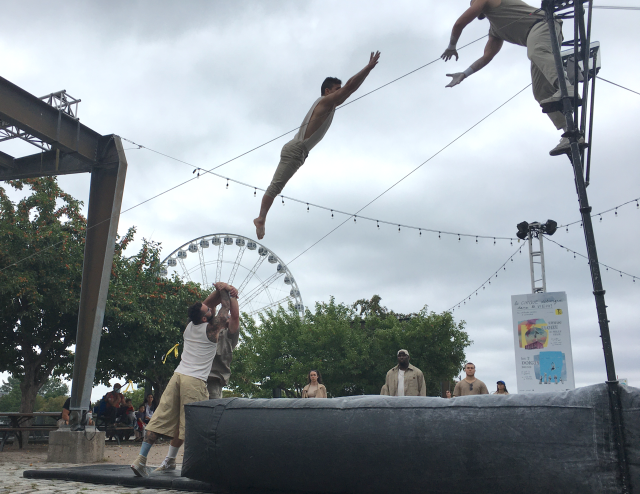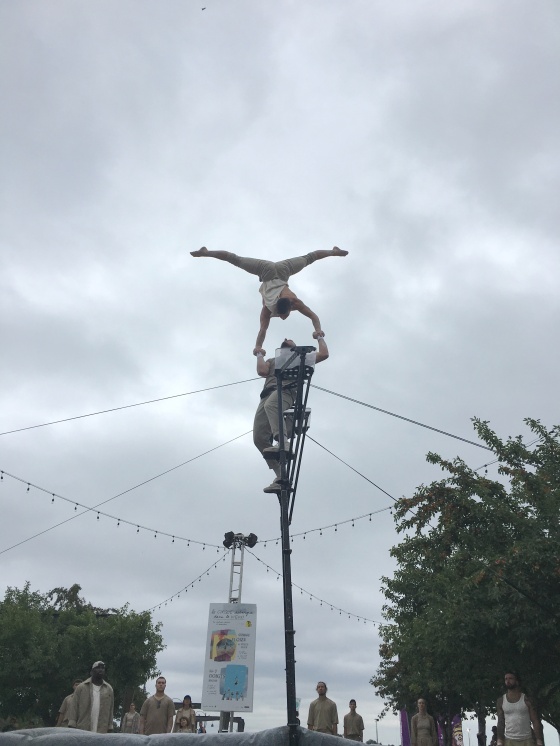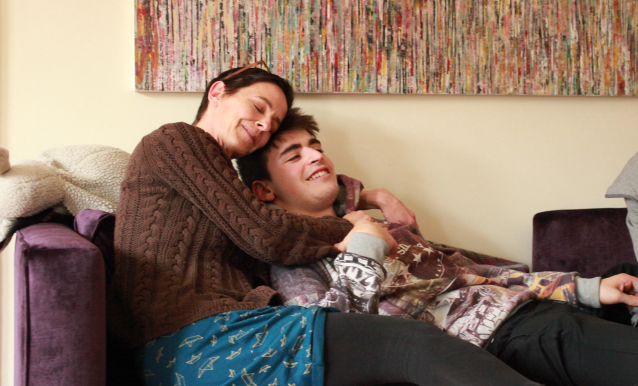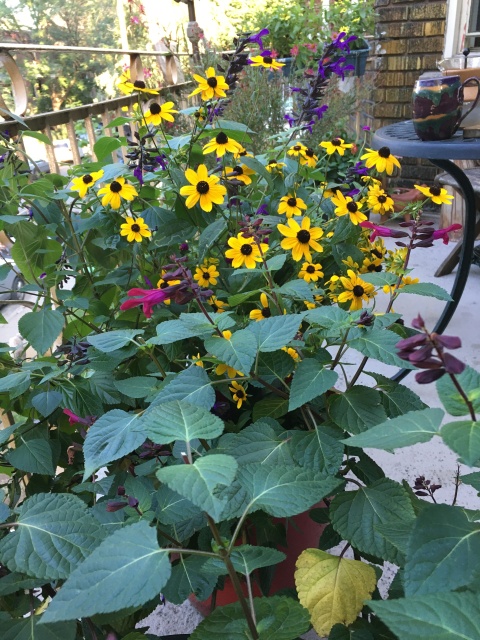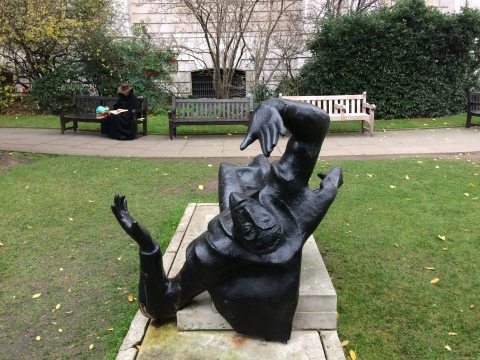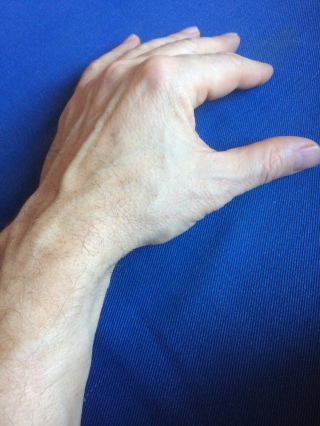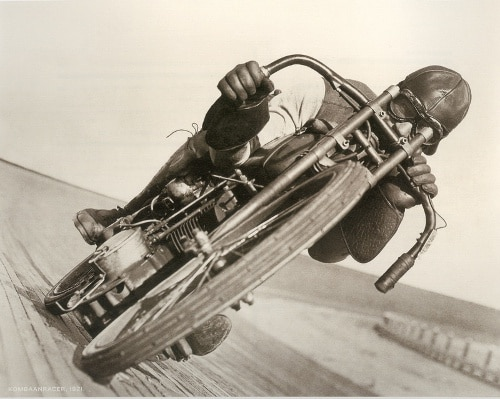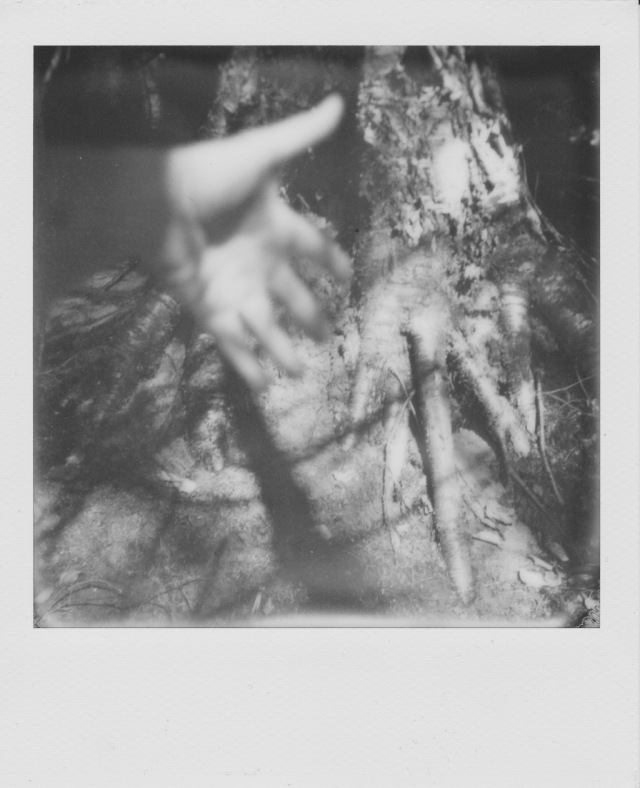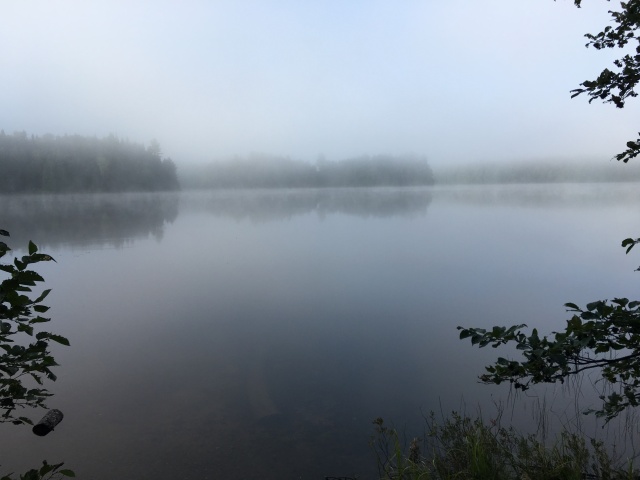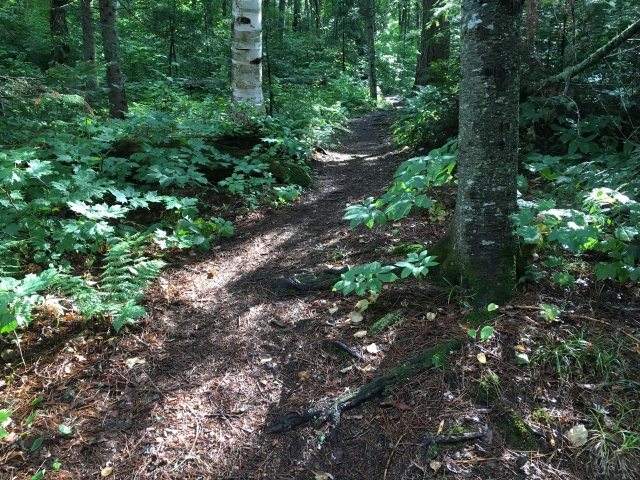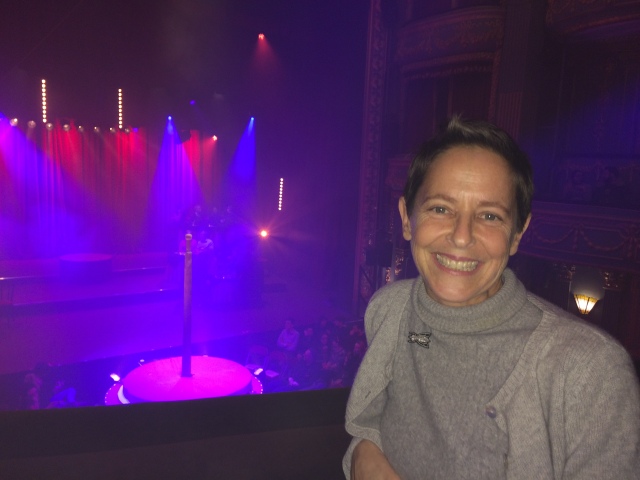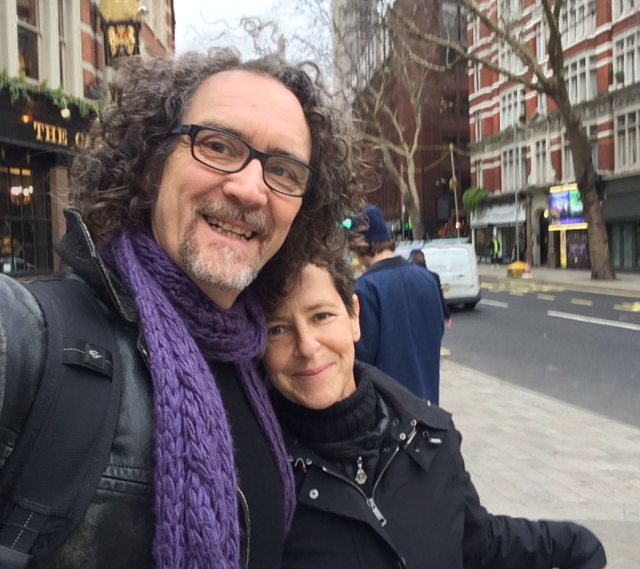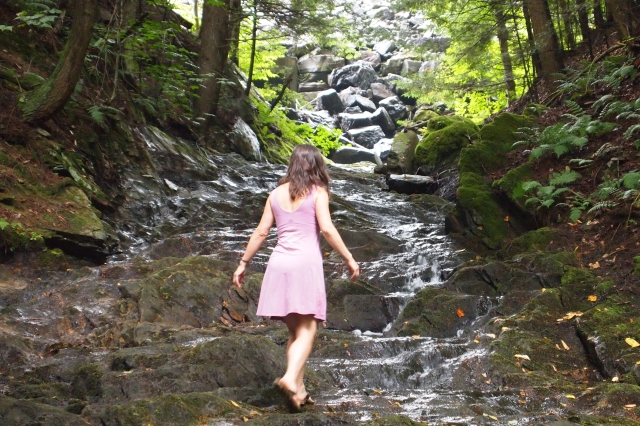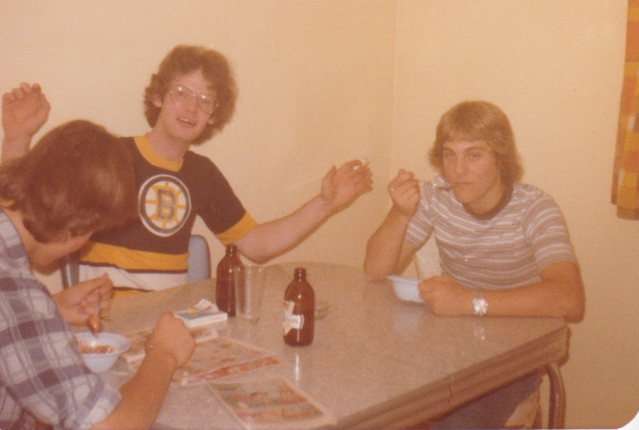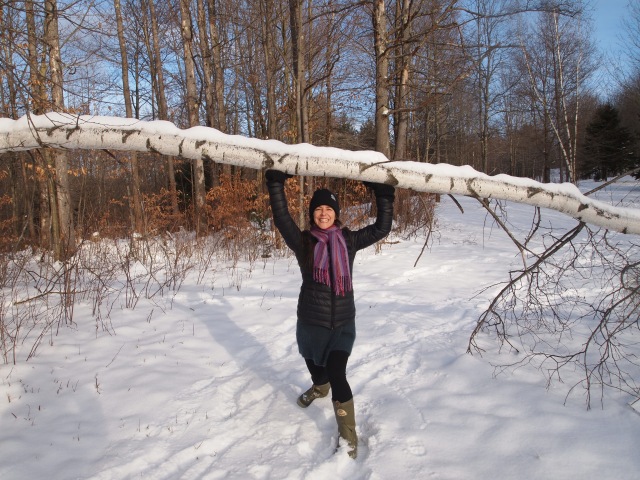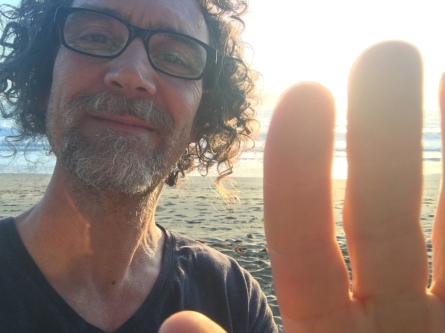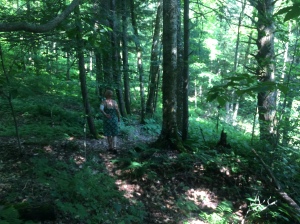I’m in the Old Port of Montreal, standing under a blue sky on a scorcher of a summer day, looking up at a man patting chalk on his head. The man’s name is Max, and he stands twelve feet in the air on stilts fixed to the ground and secured by stage rigging. He is a circus porter. In front of him, on the ground about fifteen feet away, are three men. Two of the men lock their hands to the wrists and create a woven square at the end of their arms. In one fluid motion, the third man steps onto their locked hands, and they thrust him into the air. He stretches out his arms and flies toward Max. His name is Briscoe. He is a circus flyer.
The two of them are performing as part of a circus spectacle happening on the waterfront docks in a tourist part of the city. I have been lucky enough to witness this particular act a few times over the past few of years. However, this was the first time I have seen them launch Briscoe up into Max’s waiting hands to start the show. An elegant touch, I say to myself.
I know both of these men, Max and Briscoe. But I know Briscoe not by his performing name, but as Nathan. That is the name given to him at birth by his mom. By Susan.
It has been three years since Susan died. It seems a distant memory on some days, and vivid and familiar on others. But mostly it has settled into being an extraordinary part of my life. I keep in random contact with Susan’s two sons. Often it is by way of text messages or social media. I manage to see Oliver, Nathan’s brother, two or three times a year. We’ll meet up for a coffee or a breakfast. Lately, that has meant outdoor get-togethers in all kinds of weather.
I saw Nathan last summer when he invited me to train with him in his back alley gym. It was a steamy July heat wave and I arrived at around 7 am. Nathan pulled out a homemade apparatus and I brought some weights. Working out with a circus performer is humbling and inspiring. I worked up quite a sweat just watching him do handstand push-ups on concrete cinder blocks. We finished off our training with a sparring session with boxing gloves (also a humbling experience!). Then we had a coffee, talked a bit about life during covid for a performer and how he was training each day with his circus cohort. Nathan was living with Oliver at Susan’s house, and we were sitting in her backyard. It had changed, like all of us since her death. It was filled with workout gear and some construction materials from a project that Oliver had started. In the corner was an electric scooter. It was Nathan’s mode of transport, and he noted it was not working. I offered to take a look. Turns out there was a short in the battery cable, and it needed a new connector. Nathan was pretty happy to hear that it was a simple and affordable repair. I was happy that I could diagnose it so easily. I felt a bit like a dad at that moment.
Max hurls Nathan into the air. Nathan twists and somersaults, then reaches out to Max’s grabbing hands. I stand with my arm around Wrenna, my new partner, looking up with awe at Susan’s son. There is nothing awkward about any of this. When I fell in love with Wrenna, Susan’s sons were some of the first people I shared the news with. They were both happy and, for Oliver’s part, maybe a bit relieved. It meant I was okay. I continue to marvel at the precision and strength and trust that the two performers display. I notice that they have built different breaks in between tricks. The costumes are different and so is the music. Gone is the pumping beat, replaced by a soulful melancholic moaning. I am happy and smiling and feeling so lucky and so blessed.
Then Max chalks up his hands and pats some onto his head and hair. Oh, I think. I know what’s coming. Nathan is going to do a one-armed handstand on top of Max’s head. And that’s when my eyes start to fill up with water.
I met Nathan when he was fourteen. He was in a really hard period in his life, which made for a challenging time for Susan. A tumultuous year and a half. Nathan has always been really open about his issues with addiction, and he was fine with Susan writing about their struggles as they navigated those difficult times. I was witness to those struggles and I can say that Susan, even with all her capacity, was at a loss from time to time. She would sometimes cry in despair, frustrated at her inability to help him. She tried lots of different strategies and would chase after him if he was hanging out with a rough crowd, or go looking for him in the night, but always with love and compassion. Life turned a corner when Nathan entered rehab. The journey to get him there started out with some deception, of which I was an accomplice, and ended up with me taking a bus home from Cornwall, Ontario. The details of that adventure on the 401 were something that the three of us shared. And now it is just Nathan and me left with the memory.
While he was in rehab he auditioned for the circus school. He hadn’t done any circus or gymnastics training during those months, but he impressed the teachers and was invited to the school in Montreal that autumn. In June, he came home to Susan after a nine-month stay in rehab. He was different, older, more mature, and capable. Susan was still very cautious and careful with him. She had moved out of the neighbourhood to avoid any chances of Nathan meeting up with his old crowd. Over the summer he took some gymnastics classes and began training. In August, he started circus school. He threw himself into the work. Twelve, sometimes fourteen hours days, going to school, training, working out at home. Gradually he earned more and more of Susan’s trust and he, like his older brother Oliver had, moved out of her house at age eighteen. So much life lived in such a short period of time, it seems.
Nathan climbs up on Max’s shoulder and places his hand on Max’s head. In an instant the soles of his feet are skyward. A one-armed handstand is impressive, but especially so when it’s being performed on top of someone’s head eighteen feet above the ground. And the water keeps flowing from my eyes, and then I begin to tremble and shake. Nathan pushes himself off, flips around, and into Max’s grasp for another series of somersaulting tricks. My body is vibrating, I am sobbing and trying to catch my breath. Something is coming out of me or passing through me or waking up. Wrenna tightens her grip on me. I am filled with sorrow and sadness. Deep, forgotten grief. Not neglected, merely left alone. Nathan and Max finish their act, descend and drift off from the stage with other performers who have come to escort them away. They vanish, the music stops and the show is over. My sobbing has subsided and I am smiling again. Wrenna looks at me. I am not sure how she might feel with me getting lost in my grief for those moments. She smiles and holds me tight.
I wait a few minutes for Nathan and Max to return to tear down their equipment. I see Max first and give him a big hug. Then Nathan. I tell him he made me cry and we embrace. I can feel his powerful back and muscles, and then I just start crying. I’m holding him tight and he holds me. We are both crying in each other’s arms. I tell him I am so proud of him and so happy for him. I didn’t mention Susan, that I missed her, that I was sad she had to die, that she could not be here to see him fly, that he couldn’t look out into the crowd and see her beaming face, that the two of them couldn’t laugh and reminisce about the hard days, that he didn’t have his mom to call in a moment of need. I said none of that out loud, but it’s what my body was saying. I think Nathan felt all of that, and with his own tears he told me he missed her. And maybe he was allowing some of his own grief to resurface, and by inviting that deep loss to bubble up, it reminded him just how much she loved him. I told him I loved him and he responded in kind. And all the while, Wrenna stands nearby, watching me lost in an intimate moment with the son of my dead lover. And when I release Nathan, she is there to be with me. She glows and smiles, with her own wet eyes. Her actions allow me to recall my love for Susan without apology, to spill into grief and sorrow without shame.
I watch Nathan move with grace and purpose as he and Max wrap the equipment from the show. He smiles and jokes around with the riggers, a few other performers drift by to chat. One never knows when love will show up and rumble through the heart. Watching him perform and then during our embrace I stepped back into being the Roy who loved Susan, the man who walked with her as she moved toward her death. Briscoe stepped back into being Nathan, the boy whose mom died. And the love between the two of us brought Susan back into our lives for a few precious, sad and beautiful moments.

